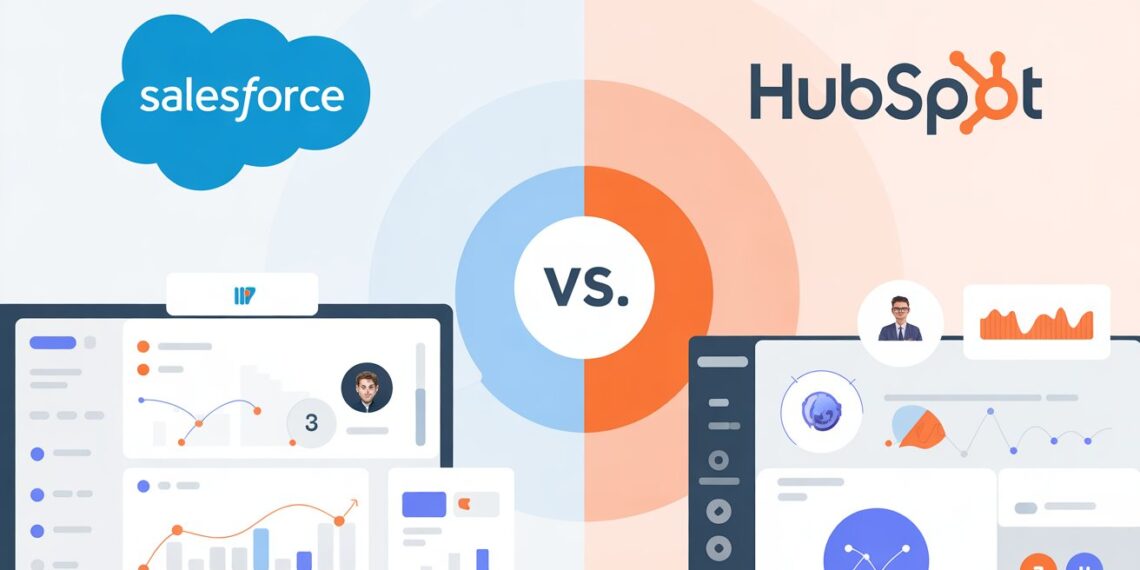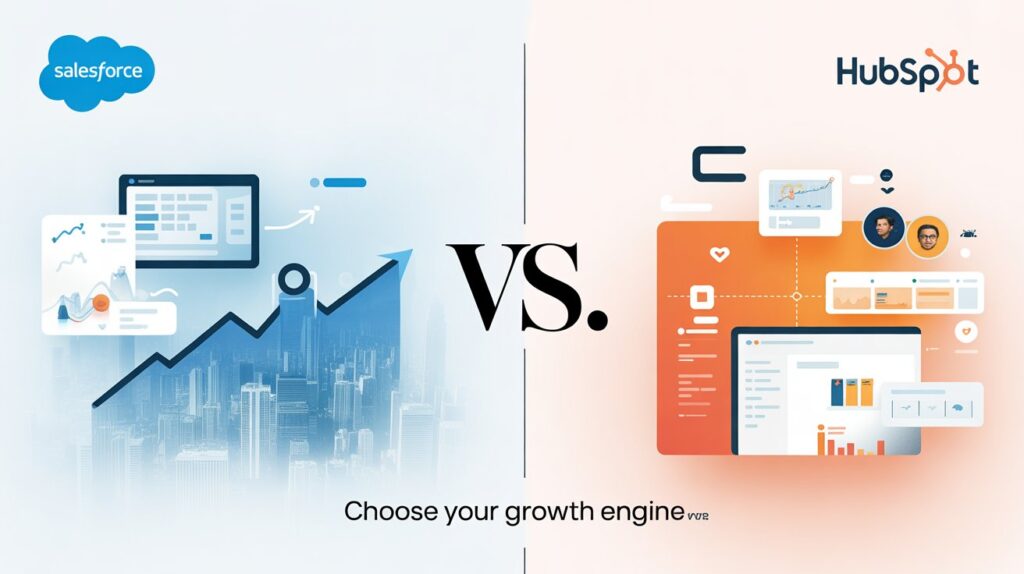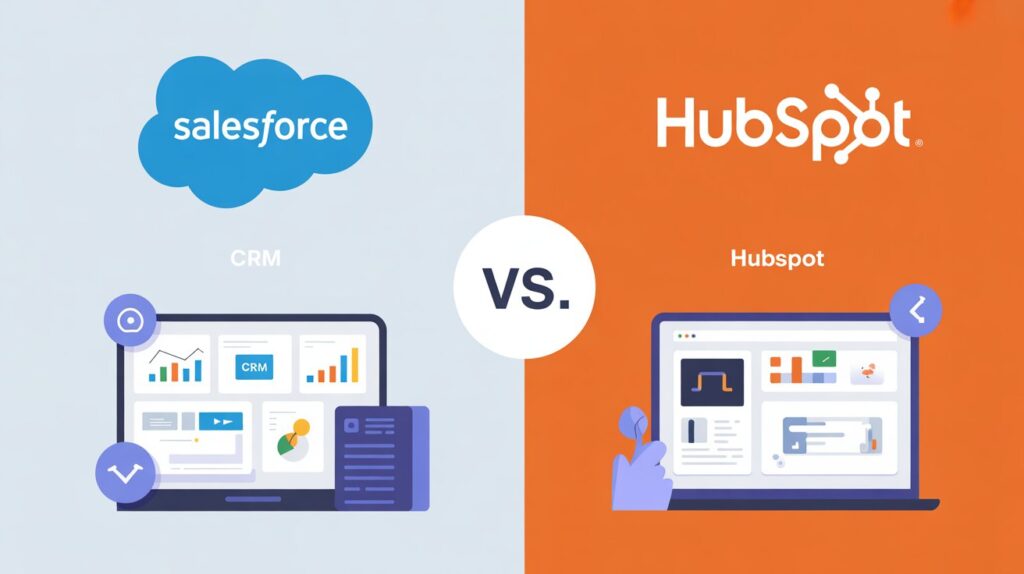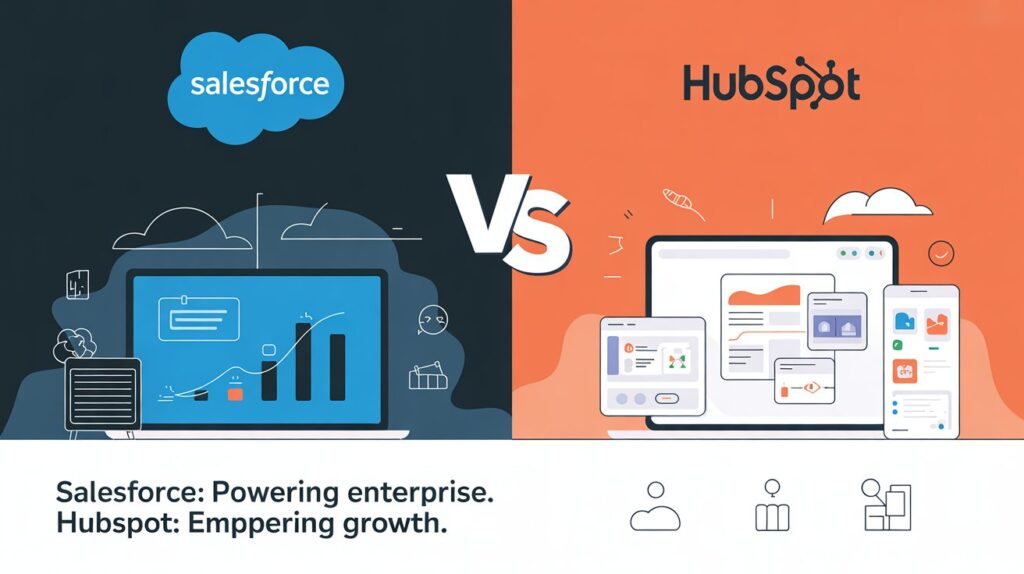Customer Relationship Management (CRM) platforms have become essential for businesses that want to manage leads, strengthen customer relationships, and drive growth through data-driven insights. The CRM industry is growing rapidly, and two names consistently dominate discussions: Salesforce and HubSpot.
Both are leaders in their own right. Salesforce is a pioneer in cloud-based CRM, known for its deep customisation, enterprise scalability, and global dominance. HubSpot, meanwhile, has gained a reputation for being approachable, affordable, and powerful for small and medium-sized businesses.
If you are reading this guide, chances are you’re considering a CRM Tools Comparison: Salesforce vs. HubSpot because you want to invest in the right platform without regrets. This is not a trivial choice: selecting a CRM affects every part of your operations—sales, marketing, customer service, and long-term scalability.
In this article, we’ll provide a comprehensive breakdown of Salesforce and HubSpot, covering features, pricing, usability, integration, implementation, support, security, and real-world use cases. By the end, you’ll have a clear picture of which CRM fits your business needs in 2025 and beyond.
Why the Right CRM Matters
CRM is no longer a “nice-to-have.” It’s the backbone of customer-driven business growth. Let’s consider why:
-
Customer insight: CRMs collect and analyse customer interactions across sales, marketing, and service channels. This single source of truth prevents siloed operations.
-
Efficiency: Automation in CRMs cuts repetitive manual work. Tasks like lead scoring, follow-ups, and report generation can be automated.
-
Revenue growth: According to Nucleus Research, the average ROI on CRM software is $8.71 for every dollar spent.
-
Scalability: As businesses grow, CRMs support higher volumes of data, customers, and team members.
-
Competitive edge: Companies with CRM adoption have 41% higher revenue per salesperson, according to Salesforce’s own research.
With stakes this high, comparing Salesforce and HubSpot isn’t just a technical exercise—it’s a strategic decision.
Quick Side-by-Side Comparison
Feature |
Salesforce |
HubSpot |
|---|---|---|
Deployment |
Cloud-based with advanced customisation |
Cloud-based, simple setup |
Pricing |
Starts at $25/user/month, scales above $300/user/month |
Free plan available; paid plans start around $18/month |
Best for |
Enterprises, complex organisations |
SMEs, startups, inbound marketing-driven teams |
Ease of Use |
Steep learning curve, requires training |
Highly intuitive, minimal onboarding |
Customisation |
Extremely flexible; endless configurations |
Limited but straightforward |
Integrations |
4,000+ apps on AppExchange |
1,000+ integrations on Marketplace |
AI Features |
Einstein AI for analytics & automation |
HubSpot AI for content and workflows |
Support |
24/7, extensive but premium tiers cost extra |
Knowledge base, academy, tiered support |
Pricing and Plans
Pricing often makes or breaks a CRM decision, so let’s explore both platforms in depth.
Salesforce Pricing
Salesforce operates on a subscription model, but its cost goes beyond monthly fees.
-
Essentials Plan – $25/user/month: Basic CRM for small teams.
-
Professional Plan – $75/user/month: Adds forecasting and reporting.
-
Enterprise Plan – $150/user/month: Most popular; includes advanced automation.
-
Unlimited Plan – $300/user/month: Full functionality, 24/7 support, and unlimited customisation.
Additional costs:
-
Implementation consulting ($5,000–$100,000 depending on scope).
-
Add-ons like Pardot (Marketing Cloud), analytics, or extra storage.
-
Ongoing admin salaries or partner contracts.
HubSpot Pricing
HubSpot’s appeal lies in its free CRM and modular paid hubs:
-
Free Plan – Contact management, live chat, limited reporting.
-
Starter (from $18/month) – Adds simple automation and email tools.
-
Professional (from $800/month) – Advanced automation, team features, marketing campaigns.
-
Enterprise (from $3,600/month for Marketing Hub) – Scalable automation, hierarchical teams, advanced reporting.
Key difference: HubSpot’s free and lower-tier options are enough for small teams, while Salesforce doesn’t offer free access.
Features and Functionality
Sales Tools
-
Salesforce: Offers advanced sales forecasting, pipeline visualisation, territory management, and role-based access. Its AI-driven Einstein feature predicts deal success and next steps.
-
HubSpot: Focuses on usability—drag-and-drop deal stages, built-in email tracking, and meeting scheduling. Ideal for straightforward sales cycles.
Marketing Tools
-
Salesforce Marketing Cloud: A separate product line with sophisticated campaign management, segmentation, and cross-channel tracking. Excellent for enterprises running large campaigns.
-
HubSpot Marketing Hub: Built into its ecosystem with content creation, SEO, blogging, and lead capture features. Perfect for inbound marketing strategies.
Service and Support Tools
-
Salesforce Service Cloud: Supports call centres, chatbots, omnichannel support, and field service management. Advanced case routing ensures service at scale.
-
HubSpot Service Hub: Provides a clean ticketing system, shared inboxes, and knowledge base tools. Tailored to small- and mid-sized teams.
Implementation & Onboarding
-
Salesforce: Deployment can take weeks or months, depending on complexity. Most companies hire certified consultants. Large enterprises may run multi-phase rollouts.
-
HubSpot: Often ready to go within hours or days. Onboarding is straightforward, with optional paid training for advanced hubs.
Verdict: Salesforce is a project; HubSpot is a quick start.
Customisation & Flexibility
-
Salesforce: Every object, field, workflow, and dashboard can be customised. Developers can build custom apps on the Salesforce platform. Perfect for industries like finance, healthcare, and manufacturing.
-
HubSpot: Customisation is simpler—create custom fields and reports, but workflows are more limited. Great for businesses that don’t want heavy configuration.
Integrations & Ecosystem
-
Salesforce AppExchange: Over 4,000 integrations, including industry-specific apps.
-
HubSpot Marketplace: 1,000+ integrations, covering essentials like Zoom, Slack, Shopify, and Gmail.
Verdict: Salesforce wins on ecosystem size, but HubSpot covers the most common integrations SMBs need.
Security & Compliance
Both platforms take security seriously.
-
Salesforce: ISO 27001, SOC 2, HIPAA-compliant with add-ons, GDPR tools. Trusted by financial institutions.
-
HubSpot: SOC 2, ISO 27001, GDPR compliance, but fewer healthcare/finance-specific certifications.
Support & Training
-
Salesforce: 24/7 phone and chat support with premium tiers. Massive global partner network. Admins often become certified Salesforce professionals.
-
HubSpot: HubSpot Academy provides free training. Support varies by plan—higher tiers get more dedicated help.
Total Cost of Ownership (TCO)
Many businesses underestimate CRM costs.
-
Salesforce TCO: Licensing + consulting + admin salaries + add-ons = significantly higher long-term spend.
-
HubSpot TCO: Lower upfront cost, free plan option, fewer hidden expenses.
Industry Use Cases
Salesforce Works Best For:
-
Financial services (complex compliance).
-
Healthcare (HIPAA requirements).
-
Enterprises (global operations, advanced workflows).
HubSpot Works Best For:
-
Startups (free plan, fast setup).
-
Marketing-driven companies (content, inbound campaigns).
-
SMBs (affordable scalability, ease of use).
Pros and Cons
Salesforce Pros
-
Limitless customisation.
-
Strong AI and analytics.
-
Global partner ecosystem.
Salesforce Cons
-
Expensive.
-
Requires expertise to manage.
-
Long onboarding.
HubSpot Pros
-
Free and affordable plans.
-
Intuitive design.
-
Strong inbound marketing tools.
HubSpot Cons
-
Limited customisation.
-
Advanced features locked in high tiers.
-
Less suited for regulated industries.
Expanded FAQs
1. Which CRM is better for a startup?
HubSpot, thanks to its free plan, simplicity, and marketing focus.
2. Which CRM is better for an enterprise?
Salesforce, due to scalability, compliance, and advanced automation.
3. How long does it take to implement Salesforce?
Anywhere from 2 weeks for simple setups to 6–12 months for enterprise rollouts.
4. Can HubSpot handle 1,000+ employees?
Yes, but Salesforce offers more robust enterprise governance tools.
5. Which CRM offers better AI?
Salesforce Einstein is more mature, though HubSpot’s AI tools are growing rapidly.
6. What’s the biggest hidden cost of Salesforce?
Consulting and admin costs, which can surpass licensing fees.
7. Is HubSpot truly free forever?
Yes, but advanced features require upgrades.
Conclusion
In this CRM Tools Comparison: Salesforce vs. HubSpot, one thing is clear: both platforms are leaders, but they serve different business profiles.
-
Salesforce: Best for enterprises needing customisation, compliance, and advanced analytics.
-
HubSpot: Best for startups and SMEs that value ease of use, affordability, and inbound marketing.
The final choice depends on your business size, budget, technical resources, and long-term strategy. Both platforms can transform customer management—but only if aligned with your goals.












